“Venezuela's soaring prices and chronic shortages have left many struggling to put meals on their tables. Recession and a dysfunctional state-run economy are forcing many in the South American OPEC country of 30 million to reduce consumption and eat less-balanced meals. 65-year-old homemaker Alida Gonzalez and her four family members in the Caracas slum of Petare now routinely skip one meal per day and increasingly rely on starches to make up for proteins that are too expensive or simply unavailable. “With the money we used to spend on breakfast, lunch and dinner, we can now buy only breakfast, and not a very good one”, said Gonzalez in her home. On a recent day the food available at their home was just half a kilo of chicken (about a pound), four plantains, some cooking oil, a small packet of rice, and a mango. The family did not know when they would be able to buy more.
In a recent survey by researchers from three major universities often critical of the government, 87 percent of the respondents said their income was insufficient to purchase food. The study of nearly 1,500 families found rising percentages of carbohydrates in diets, and found that 12 percent of those interviewed do not eat three meals a day. Government supporters have long pointed proudly to the improvement in eating under late socialist leader Hugo Chavez, who used oil income to subsidize food for the poor during his 14-year rule and won United Nations plaudits for it. But President Nicolas Maduro, Chavez's successor, has faced a collapse in the price of oil, which provides almost all foreign income. He further has blamed an opposition-led “economic war”, though critics deride that as an excuse. Either way, Venezuelans are tired and cross”. – Carlos Garcia Rawlins via Reuters
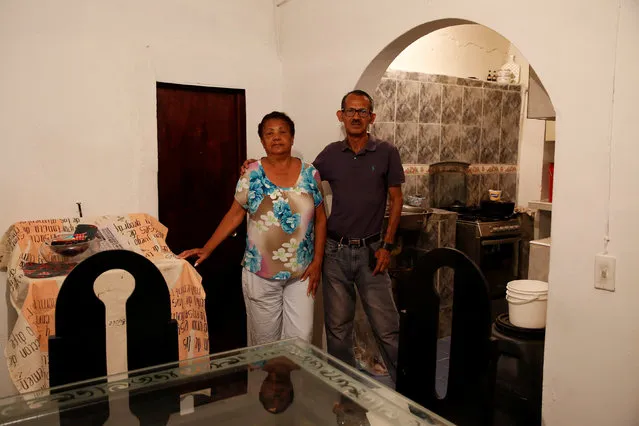
Mirella Rivero (L) and her son Jose Rivero pose for a picture at their home in Caracas, Venezuela April 15, 2016. (Photo by Carlos Garcia Rawlins/Reuters)
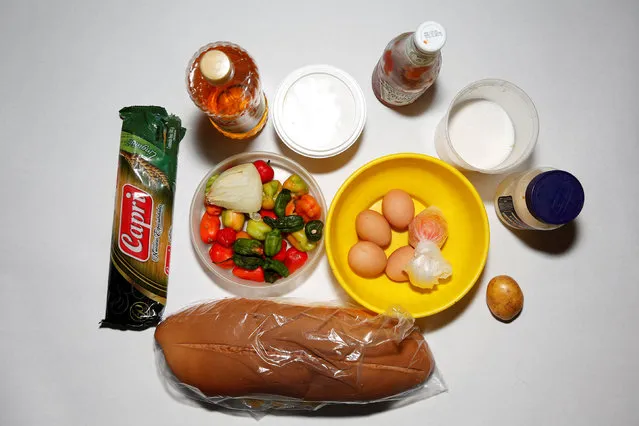
All the food available in the house of Mirella Rivero and her family, is pictured at their home in Caracas, Venezuela April 15, 2016. (Photo by Carlos Garcia Rawlins/Reuters)
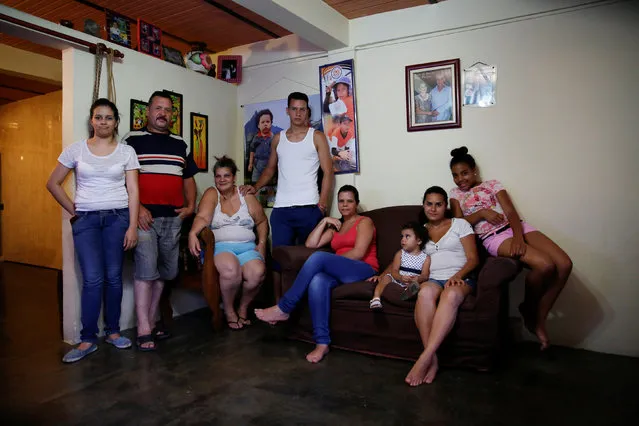
Ricardo Mendez (2nd L) poses for a picture next to his relatives (L-R) Raymari Guerra, Natalia Gerra, Ricardo Mendez, Dayana Mendez, Antonela Mendez, Yolimar Vetancourt and Liz Torres, at their home in Caracas, Venezuela April 23, 2016. “We're a big family, and it's constantly getting harder for us to eat” Mendez said. (Photo by Carlos Garcia Rawlins/Reuters)
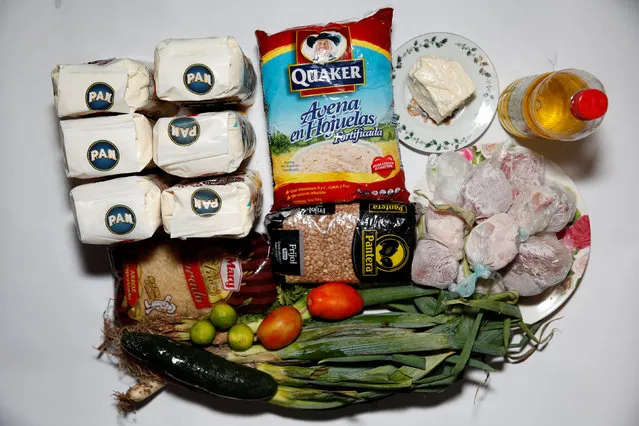
All the food available in the house of Ricardo Mendez and his family, is pictured at their home in Caracas, Venezuela April 23, 2016. (Photo by Carlos Garcia Rawlins/Reuters)
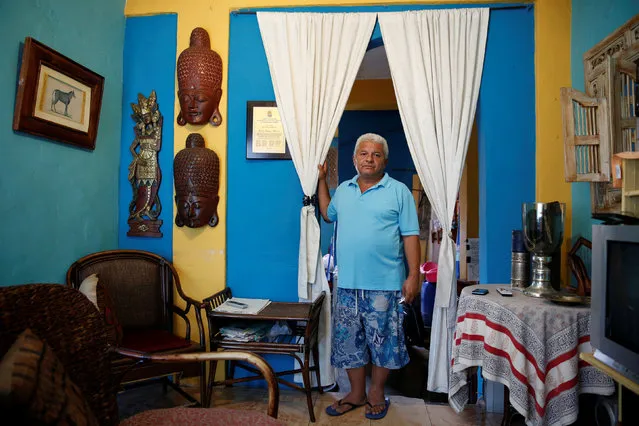
Duglas Sanchez poses for a picture at his home in Caracas, Venezuela April 23, 2016. “We are eating in a bad way, we can not eat a balanced way. If we had lunch, not dinner and if we had dinner, not breakfast”. (Photo by Carlos Garcia Rawlins/Reuters)
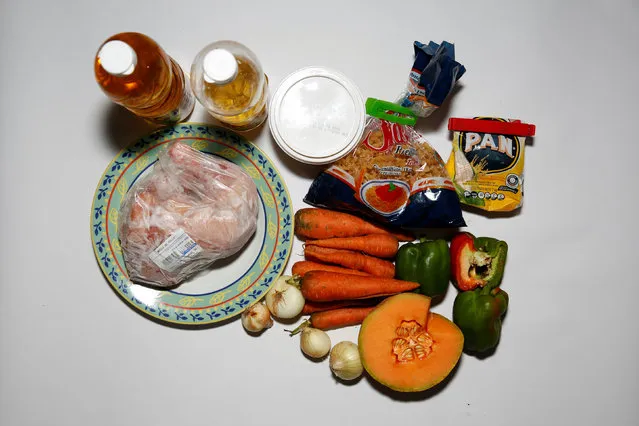
All the food available in the house of Duglas Sanchez and his family, is pictured at their home in Caracas, Venezuela April 23, 2016. (Photo by Carlos Garcia Rawlins/Reuters)
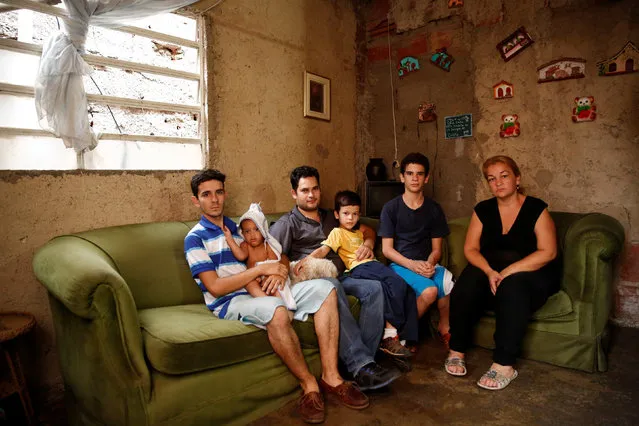
Yunni Perez (R) poses for a picture next to her relatives (L-R) Carlos Acosta, Adrian Gonzalez, Luis Oliveros, Luis Oliveros and Hector Acosta at their home in Caracas, Venezuela April 22, 2016. (Photo by Carlos Garcia Rawlins/Reuters)
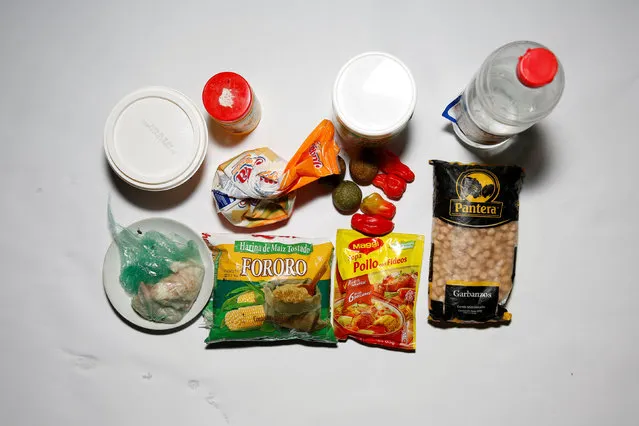
All the food available in the house of Yunni Perez and her family, is pictured at their home in Caracas, Venezuela April 22, 2016. (Photo by Carlos Garcia Rawlins/Reuters)
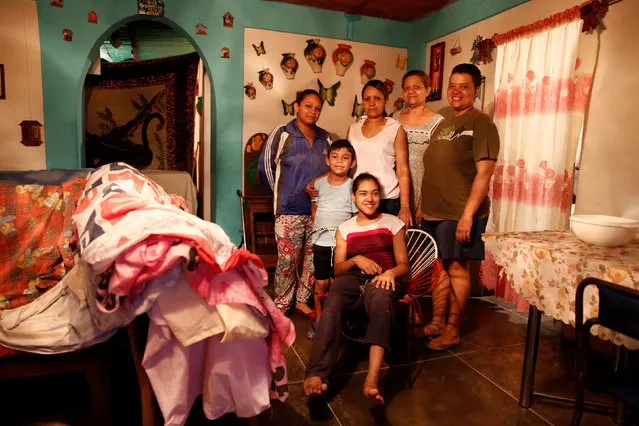
Victoria Mata (2nd R) poses for picture next to her relatives (L-R) Naibeth Pereira, Sebastian, Delis Pereira, Denis Pereira (R) and Wenderly (Front), at their home in Caracas, Venezuela April 21, 2016. “We are eating less because you can't find the foods and when they appear, the queues are hellish and we can't buy them. Now we do not eat three meals, we are eating two meals a day. If we have them”, Mata said. (Photo by Carlos Garcia Rawlins/Reuters)
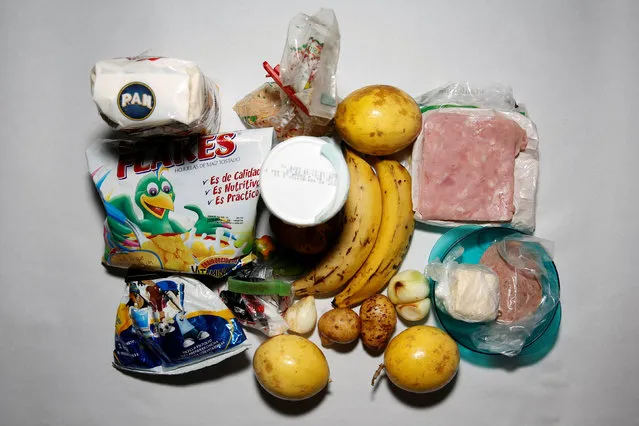
All the food available in the house of Victoria Mata and her family, is pictured at their home in Caracas, Venezuela April 21, 2016. (Photo by Carlos Garcia Rawlins/Reuters)
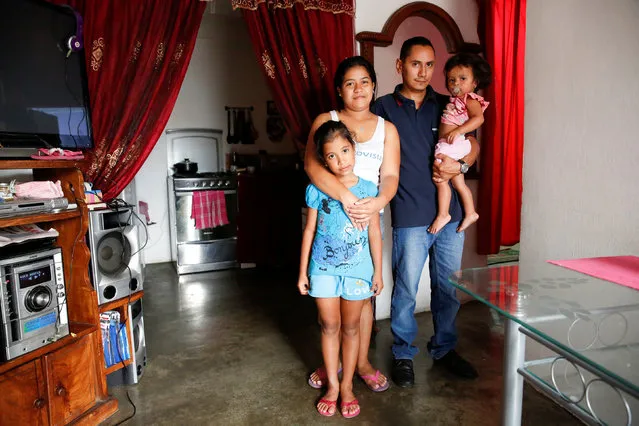
Lender Perez (2nd R), his wife Isamar Ramirez (2nd L) and their children Lismar (L) and Lucia, pose for a picture at their home in Caracas, Venezuela April 14, 2016. “We have about 15 days eating bread with cheese or arepa with cheese. We are eating worse than before, because we can't find food and those we can find we can't afford”. (Photo by Carlos Garcia Rawlins/Reuters)
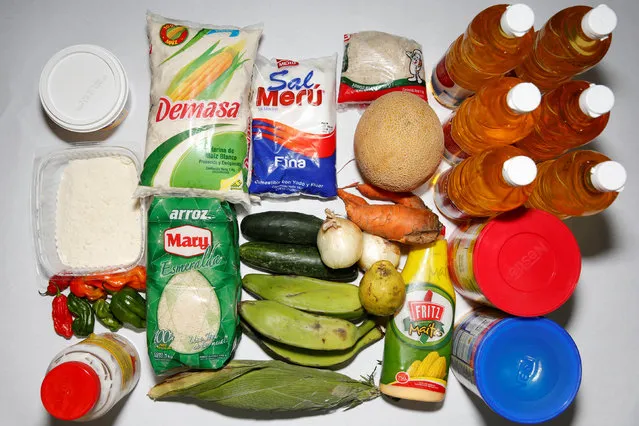
All the food available in the house of Lender Perez and his family, is pictured at their home in Caracas, Venezuela April 15, 2016. (Photo by Carlos Garcia Rawlins/Reuters)
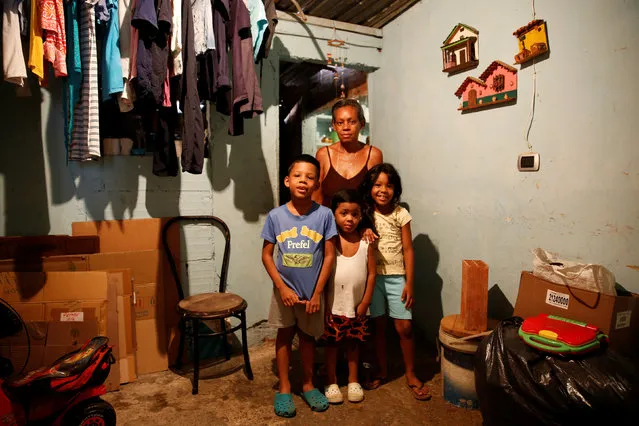
Rosa Elaisa Landaez (Back) poses for a picture next to her relatives (L-R) Albert Perez, Abel Perez and Yeiderlin Gomez at their home in Caracas, Venezuela April 23, 2016. “We are eating badly. For example, if we have corn flour, we eat arepas all day. If you have the money you can't find the foods and if you find you them you do not have enough money”, Landaez said. (Photo by Carlos Garcia Rawlins/Reuters)
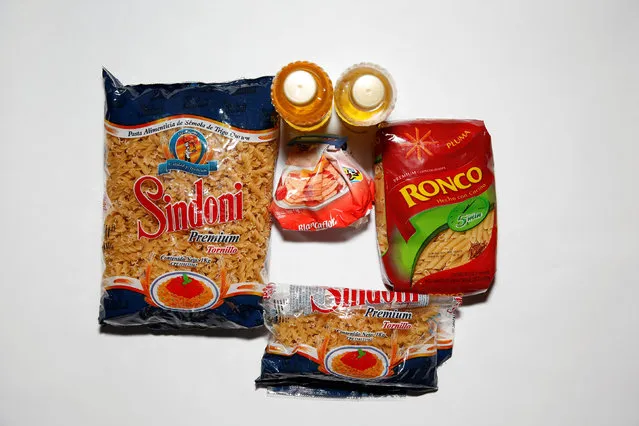
All the food available in the house of Rosa Elaisa Landaez and her family, is pictured at their home in Caracas, Venezuela April 23, 2016. (Photo by Carlos Garcia Rawlins/Reuters)
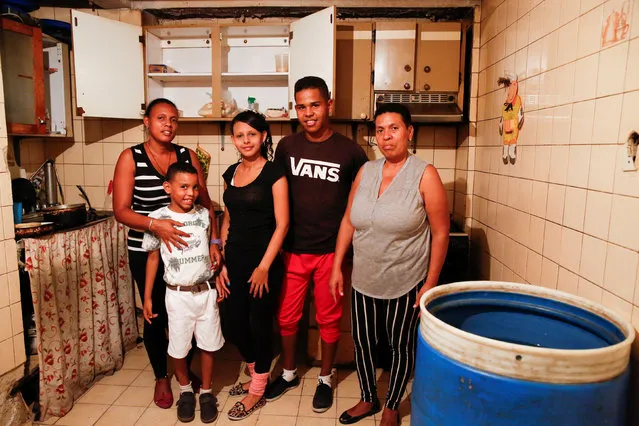
Francisca Landaeta (R) poses for a picture next to her relatives, (L-R) Luisa Gomez, Gabriel Castillo, Kerlin Garrido and Antony Arias, at their home in Caracas, Venezuela April 14, 2016. “We eat today, but we do not know what we will eat tomorrow. We are bad, I never thought it would come to this”, Landaeta said. (Photo by Carlos Garcia Rawlins/Reuters)
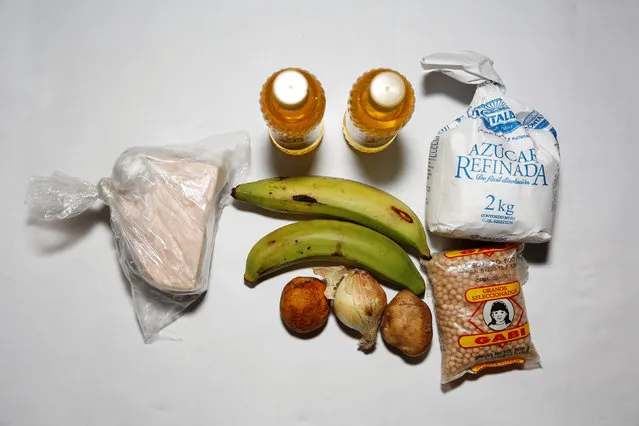
All the food available in the house of Francisca Landaeta and her family, is pictured at their home in Caracas, Venezuela April 21, 2016. (Photo by Carlos Garcia Rawlins/Reuters)
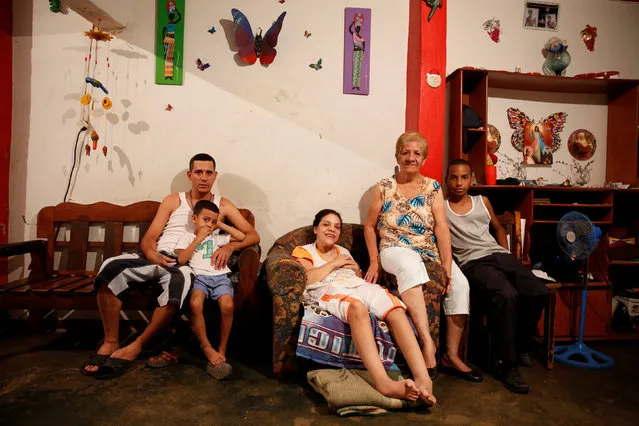
Alida Gonzalez (2nd R) poses for a picture next to her relatives (L-R) Manuel Garcia, Jesus Garcia, Maira Hernandez and Nixon Urbano, at their home in Caracas, Venezuela April 15, 2016. “With the money we used to spend on breakfast, lunch and dinner, we can now buy only breakfast - and not a very good one”, Gonzalez said. (Photo by Carlos Garcia Rawlins/Reuters)
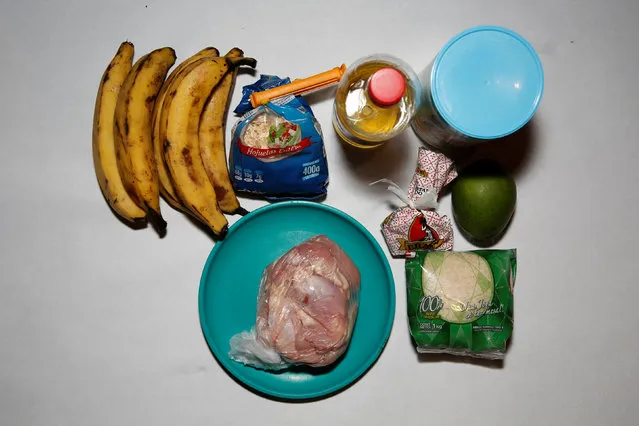
All the food available in the house of Alida Gonzalez and his family, is pictured at their home in Caracas, Venezuela April 15, 2016. (Photo by Carlos Garcia Rawlins/Reuters)
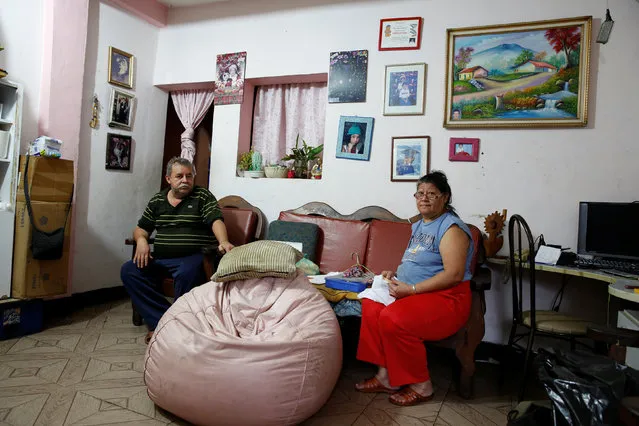
Mario Bedoya (L) and his wife Carmen Bedoya, pose for a picture at their home in Caracas, Venezuela April 21, 2016. (Photo by Carlos Garcia Rawlins/Reuters)
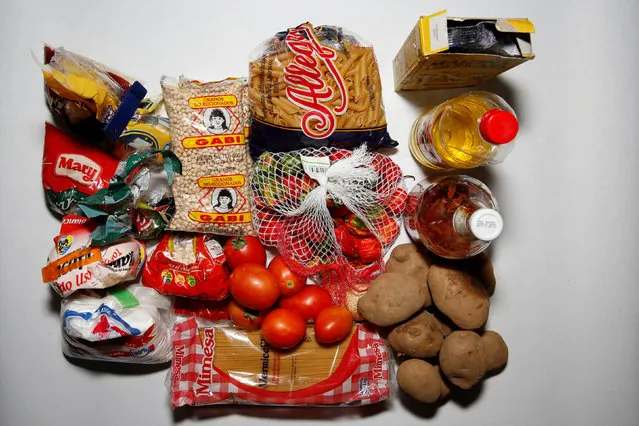
All the food available in the house of Mario Bedoya and his wife Carmen Bedoya, is pictured at their home in Caracas, Venezuela April 21, 2016. (Photo by Carlos Garcia Rawlins/Reuters)
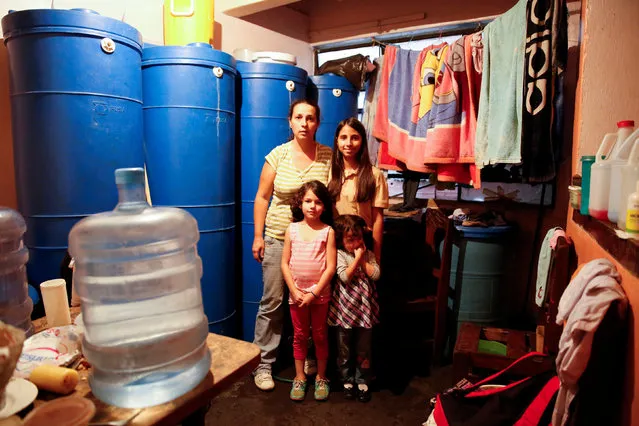
Yaneidy Guzman poses for a picture next to her daughters, Esneidy Ramirez (R), (Front L-R) Steffany Perez and Fabiana Perez, at their home in Caracas, Venezuela April 22, 2016. “Now eating is a luxury, before we could earn some money and buy clothes or something, now everything goes on food” Guzman said. (Photo by Carlos Garcia Rawlins/Reuters)
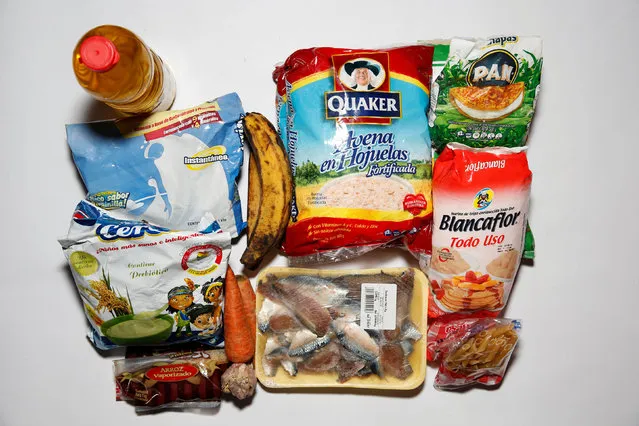
All the foods available in the house of Yaneidy Guzman and her family, is pictured at their home in Caracas, Venezuela April 22, 2016. (Photo by Carlos Garcia Rawlins/Reuters)
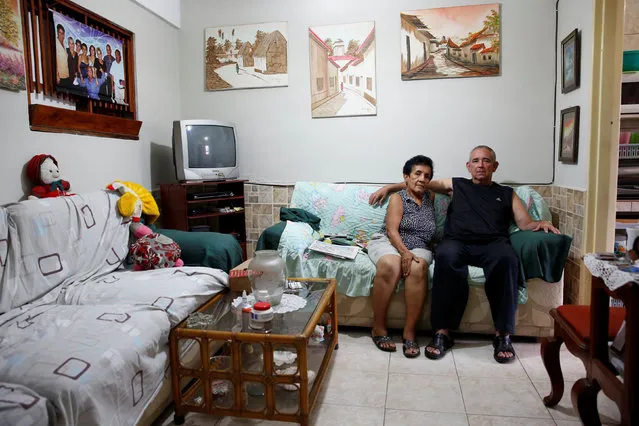
Antonio Marquez (L) and his wife Maria de Marquez, pose for a picture at their home in Caracas, Venezuela April 23, 2016. “We are eating less, because we have been limiting ourselves. We used to keep the refrigerator full, but now is no longer so”, said Marquez. (Photo by Carlos Garcia Rawlins/Reuters)
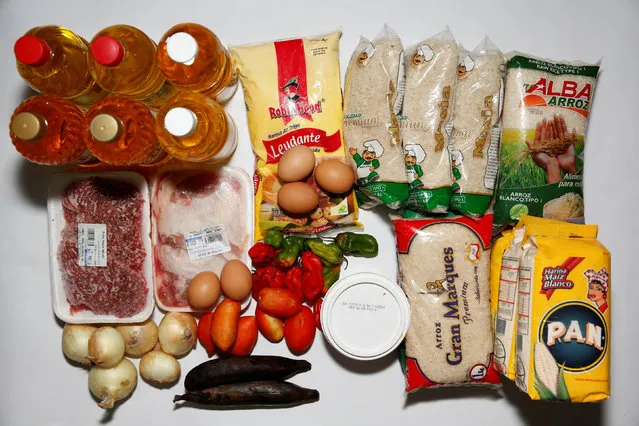
All the food available in the house of Antonio Marquez and his family, is pictured at their home in Caracas, Venezuela April 23, 2016. (Photo by Carlos Garcia Rawlins/Reuters)
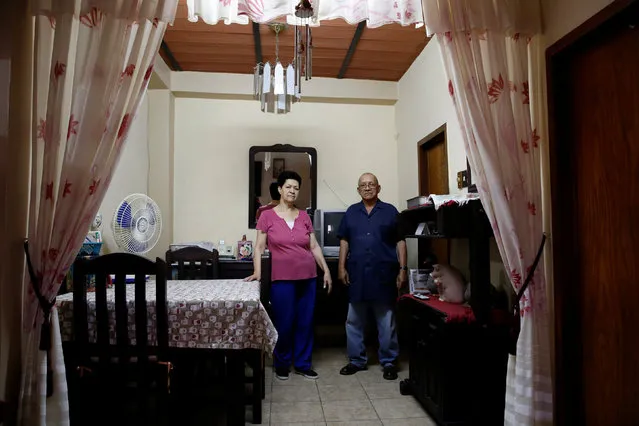
Romulo Bonalde (R) and his wife Maria de Bonalde pose for a picture at their home in Caracas, Venezuela April 23, 2016. “Before we were able to buy food for 15 days, now only we can cover our food needs for the day”, Bonalde said. (Photo by Carlos Garcia Rawlins/Reuters)
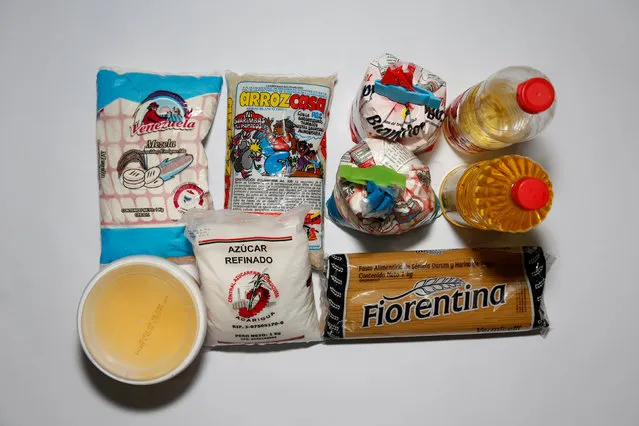
All the food available in the house of Romulo Bonalde and his family, is pictured at their home in Caracas, Venezuela April 23, 2016. (Photo by Carlos Garcia Rawlins/Reuters)
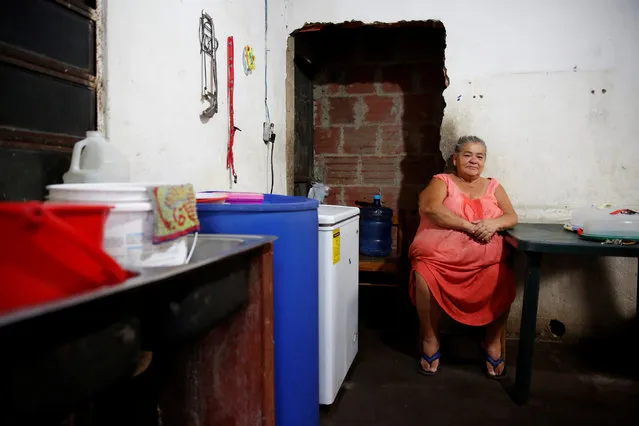
Antonia Torres poses for a picture at her home in Caracas, Venezuela April 22, 2016. “I'm eating less and also I'm eating excess things that should not be eaten” Torres said. (Photo by Carlos Garcia Rawlins/Reuters)
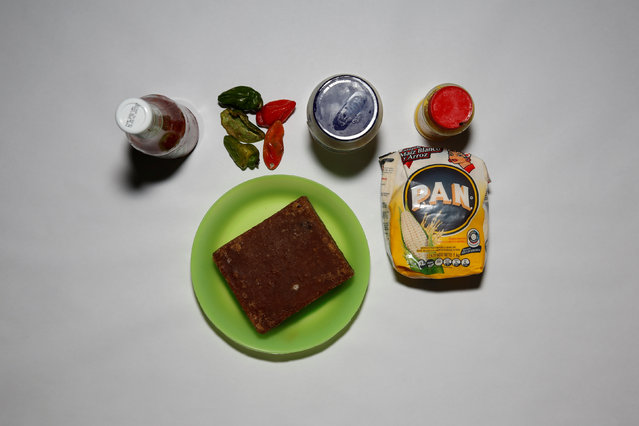
All the food available in the house of Antonia Torres and her family, is pictured at their home in Caracas, Venezuela April 22, 2016. (Photo by Carlos Garcia Rawlins/Reuters)
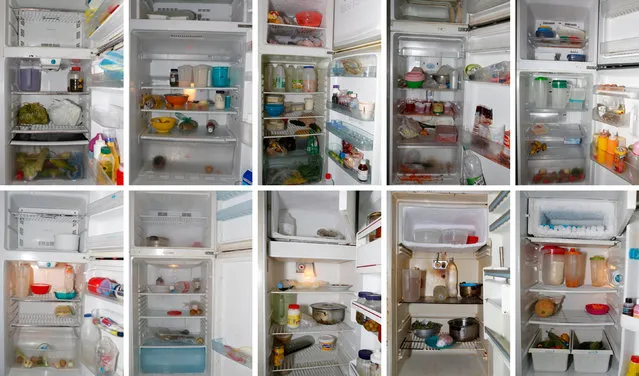
A combination photo shows the contents of peoples fridges in Caracas, Venezuela April 2016. The combination of Venezuela's sky-rocketing prices and chronic product shortages have left many struggling to put regular food on their tables and maintain a balanced diet. Amid a severe recession and dysfunctional state-run economy, poorer families say they are sometimes skipping meals and relying more on starch foods. According to one recent study, 87 percent of Venezuelans say their income is now insufficient to purchase their food needs. (Photo by Carlos Garcia Rawlins/Reuters)
In a recent survey by researchers from three major universities often critical of the government, 87 percent of the respondents said their income was insufficient to purchase food. The study of nearly 1,500 families found rising percentages of carbohydrates in diets, and found that 12 percent of those interviewed do not eat three meals a day. Government supporters have long pointed proudly to the improvement in eating under late socialist leader Hugo Chavez, who used oil income to subsidize food for the poor during his 14-year rule and won United Nations plaudits for it. But President Nicolas Maduro, Chavez's successor, has faced a collapse in the price of oil, which provides almost all foreign income. He further has blamed an opposition-led “economic war”, though critics deride that as an excuse. Either way, Venezuelans are tired and cross”. – Carlos Garcia Rawlins via Reuters

Mirella Rivero (L) and her son Jose Rivero pose for a picture at their home in Caracas, Venezuela April 15, 2016. (Photo by Carlos Garcia Rawlins/Reuters)

All the food available in the house of Mirella Rivero and her family, is pictured at their home in Caracas, Venezuela April 15, 2016. (Photo by Carlos Garcia Rawlins/Reuters)

Ricardo Mendez (2nd L) poses for a picture next to his relatives (L-R) Raymari Guerra, Natalia Gerra, Ricardo Mendez, Dayana Mendez, Antonela Mendez, Yolimar Vetancourt and Liz Torres, at their home in Caracas, Venezuela April 23, 2016. “We're a big family, and it's constantly getting harder for us to eat” Mendez said. (Photo by Carlos Garcia Rawlins/Reuters)

All the food available in the house of Ricardo Mendez and his family, is pictured at their home in Caracas, Venezuela April 23, 2016. (Photo by Carlos Garcia Rawlins/Reuters)

Duglas Sanchez poses for a picture at his home in Caracas, Venezuela April 23, 2016. “We are eating in a bad way, we can not eat a balanced way. If we had lunch, not dinner and if we had dinner, not breakfast”. (Photo by Carlos Garcia Rawlins/Reuters)

All the food available in the house of Duglas Sanchez and his family, is pictured at their home in Caracas, Venezuela April 23, 2016. (Photo by Carlos Garcia Rawlins/Reuters)

Yunni Perez (R) poses for a picture next to her relatives (L-R) Carlos Acosta, Adrian Gonzalez, Luis Oliveros, Luis Oliveros and Hector Acosta at their home in Caracas, Venezuela April 22, 2016. (Photo by Carlos Garcia Rawlins/Reuters)

All the food available in the house of Yunni Perez and her family, is pictured at their home in Caracas, Venezuela April 22, 2016. (Photo by Carlos Garcia Rawlins/Reuters)

Victoria Mata (2nd R) poses for picture next to her relatives (L-R) Naibeth Pereira, Sebastian, Delis Pereira, Denis Pereira (R) and Wenderly (Front), at their home in Caracas, Venezuela April 21, 2016. “We are eating less because you can't find the foods and when they appear, the queues are hellish and we can't buy them. Now we do not eat three meals, we are eating two meals a day. If we have them”, Mata said. (Photo by Carlos Garcia Rawlins/Reuters)

All the food available in the house of Victoria Mata and her family, is pictured at their home in Caracas, Venezuela April 21, 2016. (Photo by Carlos Garcia Rawlins/Reuters)

Lender Perez (2nd R), his wife Isamar Ramirez (2nd L) and their children Lismar (L) and Lucia, pose for a picture at their home in Caracas, Venezuela April 14, 2016. “We have about 15 days eating bread with cheese or arepa with cheese. We are eating worse than before, because we can't find food and those we can find we can't afford”. (Photo by Carlos Garcia Rawlins/Reuters)

All the food available in the house of Lender Perez and his family, is pictured at their home in Caracas, Venezuela April 15, 2016. (Photo by Carlos Garcia Rawlins/Reuters)

Rosa Elaisa Landaez (Back) poses for a picture next to her relatives (L-R) Albert Perez, Abel Perez and Yeiderlin Gomez at their home in Caracas, Venezuela April 23, 2016. “We are eating badly. For example, if we have corn flour, we eat arepas all day. If you have the money you can't find the foods and if you find you them you do not have enough money”, Landaez said. (Photo by Carlos Garcia Rawlins/Reuters)

All the food available in the house of Rosa Elaisa Landaez and her family, is pictured at their home in Caracas, Venezuela April 23, 2016. (Photo by Carlos Garcia Rawlins/Reuters)

Francisca Landaeta (R) poses for a picture next to her relatives, (L-R) Luisa Gomez, Gabriel Castillo, Kerlin Garrido and Antony Arias, at their home in Caracas, Venezuela April 14, 2016. “We eat today, but we do not know what we will eat tomorrow. We are bad, I never thought it would come to this”, Landaeta said. (Photo by Carlos Garcia Rawlins/Reuters)

All the food available in the house of Francisca Landaeta and her family, is pictured at their home in Caracas, Venezuela April 21, 2016. (Photo by Carlos Garcia Rawlins/Reuters)

Alida Gonzalez (2nd R) poses for a picture next to her relatives (L-R) Manuel Garcia, Jesus Garcia, Maira Hernandez and Nixon Urbano, at their home in Caracas, Venezuela April 15, 2016. “With the money we used to spend on breakfast, lunch and dinner, we can now buy only breakfast - and not a very good one”, Gonzalez said. (Photo by Carlos Garcia Rawlins/Reuters)

All the food available in the house of Alida Gonzalez and his family, is pictured at their home in Caracas, Venezuela April 15, 2016. (Photo by Carlos Garcia Rawlins/Reuters)

Mario Bedoya (L) and his wife Carmen Bedoya, pose for a picture at their home in Caracas, Venezuela April 21, 2016. (Photo by Carlos Garcia Rawlins/Reuters)

All the food available in the house of Mario Bedoya and his wife Carmen Bedoya, is pictured at their home in Caracas, Venezuela April 21, 2016. (Photo by Carlos Garcia Rawlins/Reuters)

Yaneidy Guzman poses for a picture next to her daughters, Esneidy Ramirez (R), (Front L-R) Steffany Perez and Fabiana Perez, at their home in Caracas, Venezuela April 22, 2016. “Now eating is a luxury, before we could earn some money and buy clothes or something, now everything goes on food” Guzman said. (Photo by Carlos Garcia Rawlins/Reuters)

All the foods available in the house of Yaneidy Guzman and her family, is pictured at their home in Caracas, Venezuela April 22, 2016. (Photo by Carlos Garcia Rawlins/Reuters)

Antonio Marquez (L) and his wife Maria de Marquez, pose for a picture at their home in Caracas, Venezuela April 23, 2016. “We are eating less, because we have been limiting ourselves. We used to keep the refrigerator full, but now is no longer so”, said Marquez. (Photo by Carlos Garcia Rawlins/Reuters)

All the food available in the house of Antonio Marquez and his family, is pictured at their home in Caracas, Venezuela April 23, 2016. (Photo by Carlos Garcia Rawlins/Reuters)

Romulo Bonalde (R) and his wife Maria de Bonalde pose for a picture at their home in Caracas, Venezuela April 23, 2016. “Before we were able to buy food for 15 days, now only we can cover our food needs for the day”, Bonalde said. (Photo by Carlos Garcia Rawlins/Reuters)

All the food available in the house of Romulo Bonalde and his family, is pictured at their home in Caracas, Venezuela April 23, 2016. (Photo by Carlos Garcia Rawlins/Reuters)

Antonia Torres poses for a picture at her home in Caracas, Venezuela April 22, 2016. “I'm eating less and also I'm eating excess things that should not be eaten” Torres said. (Photo by Carlos Garcia Rawlins/Reuters)

All the food available in the house of Antonia Torres and her family, is pictured at their home in Caracas, Venezuela April 22, 2016. (Photo by Carlos Garcia Rawlins/Reuters)

A combination photo shows the contents of peoples fridges in Caracas, Venezuela April 2016. The combination of Venezuela's sky-rocketing prices and chronic product shortages have left many struggling to put regular food on their tables and maintain a balanced diet. Amid a severe recession and dysfunctional state-run economy, poorer families say they are sometimes skipping meals and relying more on starch foods. According to one recent study, 87 percent of Venezuelans say their income is now insufficient to purchase their food needs. (Photo by Carlos Garcia Rawlins/Reuters)
28 Apr 2016 12:30:00,
post received
0 comments
